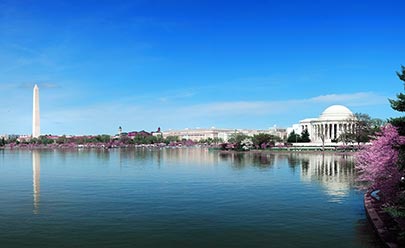The Washington, D.C. area may not be a hot retirement destination like the Sun Belt, but there are plenty of advantages to retiring near the nation’s capital. “Near” is a key word. The D.C. region is home to 6 million people, and only about 680,000 of them live in the District of Columbia itself. The rest are in Maryland cities such as Silver Spring and Gaithersburg, or Virginia cities such as Woodbridge and Fredericksburg.
Still, whether you want to be closer to grandkids or you hear the Atlantic coast calling your name, retiring in the D.C. area is undoubtedly worth considering. To help you make an informed decision, we’ve compiled a list of pros and cons to consider.
Pros of Retiring in the Washington, D.C. Area

Prime Location on East Coast
The Washington, D.C. region holds a prime spot along the central East Coast. By car or train, you can easily get to Baltimore, Philadelphia, New York City, and Atlantic City. If you prefer a day at the beach or a mountain hike, those are within reach, too. D.C. is about 70 miles from Shenandoah National Forest and 120 miles from the Delaware beaches. What about the weather? The D.C. region is less prone to natural disaster than some areas, and the weather is fair. You’ll enjoy four seasons without too much extreme heat or cold.
Variety of Neighborhoods
The D.C. region has a variety of neighborhoods and housing types. You can live in the heart of the city in a condo or apartment, in the suburbs in a townhouse or single-family home, or a little farther out on a plot of farmland. Architectural styles range from historic to modern. There’s a community for every lifestyle here.
Lots to Do, from History to Theater

There’s no shortage of things to do in and around the capital city either. Once you’re done seeing the myriad national landmarks, you’ll enjoy a cornucopia of diverse cuisine as well as culture and entertainment opportunities. Budget bonus: Admission is free for all the Smithsonian museums in the D.C. region, plus the National Zoo.
History buffs, of course, will enjoy Revolutionary and Civil War historic sites throughout Northern Virginia, from Old Town Alexandria and nearby Mount Vernon, to Fredericksburg & Spotsylvania National Military Park. Discount shoppers can spend days lost at Potomac Mills in Woodbridge. For cultural enthusiasts, Washington is one of the nation’s premier theater cities. You’ll catch many Broadway-bound shows trying out here first.
Diverse Population
The Washington, D.C. area is one of the nation’s most diverse regions. In fact, an analysis of census data found that the D.C. area communities of Lorton, Virginia, and Germantown, Maryland were among the 25 most diverse communities in the U.S. Here, you’ll find people from different ethnic backgrounds, religions, and nationalities. The Washington area also is the most educated region in the nation.
Cons of Retiring in the D.C. Area

Traffic
Though not as bad as Los Angeles, the Washington region has notoriously heavy traffic. Unfortunately, one source of relief, the Metro subway system, has been plagued by disrepair, breakdowns, and calamities lately. Still, especially if you are retired and can ride during off-peak hours, the subway can get you into town from Northern Virginia and Southern Maryland. Budget bonus: subway riders age 65+ can get discounts up to 50 percent. Amtrak in D.C. also can get you up and down the coast, again with a senior travel discount.
High Cost of Living
Washington, D.C.’s cost of living is among the highest in the nation. Salaries are also above average, but that isn’t much help for retirees. Unless money is no object, moving to the suburbs is best. With some exceptions, home and rent prices are a bit more reasonable outside the city limits.
High-Stress Level
Many D.C. residents are highly motivated to get ahead in their careers, whether in politics, finance, or business. They work long hours and often struggle to find a balance between personal and professional life. Washington also has one of the nation’s highest poverty rates among cities of its size. Whether running in the “rat race” or living below the poverty line, a sizeable portion of the D.C. population is extremely stressed. Fortunately, if you live outside the city, you’re likely to find a more peaceful populace in rural and suburban areas.
Ready to Retire in the Washington, D.C. Area?
Discover retirement communities in the Washington, D.C., area on After55.com. You’ll find 55+ apartments, independent living communities, and assisted living facilities in many locations and price ranges.

